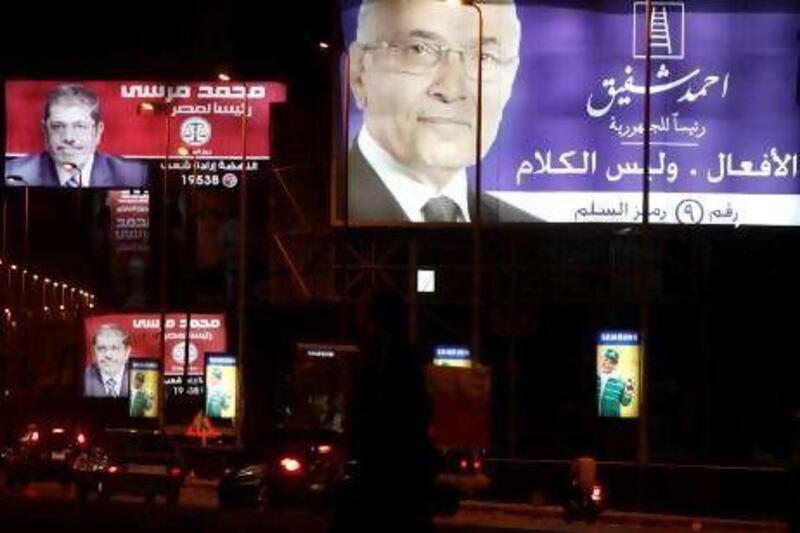CAIRO // Finding a president who will revive Egypt's failing economy has left voters with a stark choice between a candidate who favours massive state intervention and one who believes that small businesses are the key to prosperity.
The role and power of the state divides the economic manifestos of Ahmed Shafiq, Mubarak's last prime minister, and Mohammed Morsi, the candidate of the Muslim Brotherhood.
For the next two weeks, both will attempt to win the support of the defeated candidates from the first round of polling.
Mr Shafiq's supporters portray him as a strong hand who can restore stability, while his detractors brand him as the military's choice for president. His campaign pledges to boost state and private partnership through the creation of "national agencies" to combat unemployment, boost training and incorporate small and medium-sized businesses into the mainstream economy.
His policies would create residential and industrial cities and water desalination plants, much in the vein of Mubarak's "mega-project" agenda that saw cities rise out of the desert and billions of dollars of investment sunk into agricultural to boost domestic food production.
By contrast, his opponent talks of galvanising the private sector to generate growth and jobs. Mr Manzi says he will limit the state's role to core essentials such as health and education.
An engineer by trade, Mr Morsi has the backing of the powerful Muslim Brotherhood and, while he is not as popular as the Brotherhood's first choice candidate, Khairat Al Shater, he espouses the same principles of applying Islamic law and drawing on the grass-root community to win a majority.
If Mr Morsi wins the presidency, economists say the Muslim Brotherhood would be able to take advantage of its majority in parliament to push through legislation without the political jockeying that Mr Shafiq might face.
With Egypt creaking under the pressure of a long-winded and messy transition to democracy, there are increased calls for a delicate balance to aligning the economic agenda with social priorities.
"We need liberal economic policies with an eye on the social dimension," said Hussein Choucri, the chairman and managing director of HC Securities & Investment in Egypt. "We need soft-hearted capitalism in a way."
The Brotherhood's "Renaissance Project" emphasises support for grass roots businesses, but is more ambiguous when it comes to large enterprises.
Instead, the Brotherhood talks about developing Egypt within Islamic principles, including proposals for a Zakat fund, funded by the 2.5 per cent donation from Muslims to help the poor and to improve education, and an increased emphasis on Islamic bonds and Islamic finance alongside conventional financial instruments.
The group's platform also advocates increased privatisation of industry, deregulation and tax cuts to spur growth.
At the highest level of Egypt's business community, Mr Shafiq is broadly seen as a safe bet.
His polished business experience - including his role in restructuring Egyptair, the state airline, and securing World Bank funding for the construction of Cairo International Airport's new terminal - could leave him well-placed to negotiate with the military and the parliament on economic policy, including securing the much-needed International Monetary Fund loan.
But whoever wins, it is unlikely that either candidate will be able to swiftly cut the burgeoning budget deficit, boost revenues and invest in huge infrastructure projects within their first term as president.
"We still have a huge step to go," said Mazan Hassan, a political science professor at Cairo University. "Egypt will suffer for quite some time, and I don't see a huge pick-up in growth in the coming year to generate enough revenues to cut the deficit".
* The National





